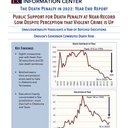Jefferson Parish near New Orleans has sent 28 people to death row since the death penalty was reinstated in 1975, many of them under the current District Attorney, Paul Connick Jr., who took office in 1997. But no one has been sentenced to death in that parish in the past 5 years and prosecutors haven’t even tried a capital case in the past 4 years, despite a number of high-profile murders. This decrease in death sentencing is not unique to Louisiana. “The trend in these numbers, as across the country, reflects the emerging view that life without parole is an incredibly serious punishment and that juries, prosecutors, the public and family members of victims are increasingly preferring the certainty of a life sentence over the confusion and delays, multiple retrials and high error rates that are inherent in capital cases,” said Jelpi Picou, executive director of the Capital Appeals Project in New Orleans. The last execution resulting from a case from Jefferson Parish was in 1993 and half of those sentenced from the parish have had their death sentences reversed.
D.A. Connick said that his office’s approach has evolved as prosecutors have learned more about the long-term reality of capital prosecutions. He indicated that prosecutors, defense attorneys and judges together “have to do the perfect case” to ensure death sentences are not overturned. “It’s difficult,” Connick said.
(P. Purpura, “Surge in death penalty prosecutions slows in Jefferson Parish,” Times-Picayune (LA), July 6, 2009). See Sentencing.
.



